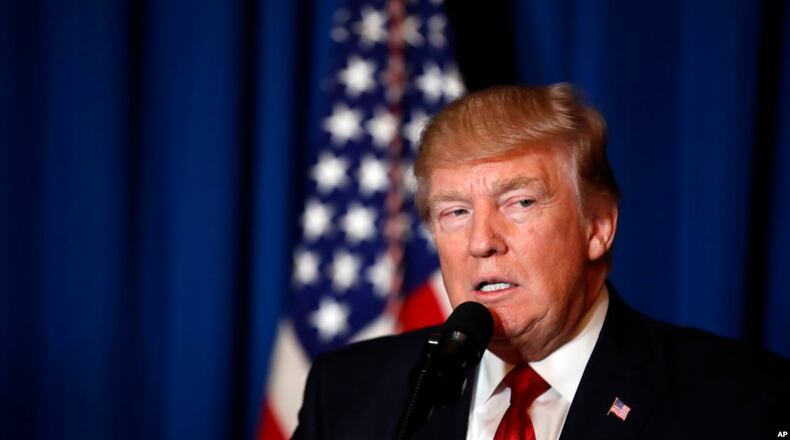"President Donald Trump impressed senators Wednesday with a cogent, engaged pitch on health care that didn’t veer wildly from the script."
That's the opening sentence in a Politico story this morning, because apparently it's news when our president manages to act cogent and engaged on an important topic. That's how far we've lowered the bar. But as the story also notes, the moment proved transitory. Within an hour of that meeting with Republican senators, the president was in the Oval Office talking to New York Times reporters, and all hell broke loose.
Trump harshly berated his own attorney general, Jeff Sessions, a man who has backed Trump since the days when no one thought he had a chance, for deciding to recuse himself in the Russia investigation.
"Sessions should have never recused himself, and if he was going to recuse himself, he should have told me before he took the job, and I would have picked somebody else," Trump said, describing it as "very unfair to the president."
That recusal decision came more than four months ago, and Sessions had no real choice. You can't have an investigation into the Trump campaign headed by someone who had been deeply involved at the top levels of the Trump campaign. Nonetheless, it still clearly grates on Trump. He's still upset that as a result of Sessions' decision, he doesn't have a Trump man in charge of an investigation into the Trump campaign; he doesn't have someone whose loyalty he can call upon if it becomes necessary.
Trump went on to offer the novel theory that "the FBI person really reports directly to the president of the United States, which is interesting. You know, which is interesting." It is indeed interesting, because U.S. law says no such thing. It says the FBI director reports to the attorney general, a line of authority created to insulate the law enforcement agency from political pressure. Trump doesn't want to hear about such boundaries.
The president then questioned the impartiality of almost the entire FBI and Justice Department professional leadership, suggesting that they're all out to get him.
Deputy Attorney General Rod Rosenstein, a career prosecutor who oversees the Russia investigation after Sessions' recusal?
"Rosenstein is from Baltimore. There are very few Republicans in Baltimore, if any. So, he’s from Baltimore."
Acting FBI Director Andrew McCabe, a career FBI agent?
His wife ran for the Virginia state Senate two years ago. She ran as a Democrat. She took campaign money from a political action committee linked to Virginia Gov. Terry McAuliffe. And McAuliffe is friends with the Clintons, so ....
Special counsel Robert Mueller?
"A special counsel should never have been appointed in this case."
Would Mueller be crossing a red line if he began investigating Trump family finances as part of his probe?
"I think that’s a violation. Look, this is about Russia."
Would he consider firing Mueller if his probe did expand?
"I can’t, I can’t answer that question because I don’t think it’s going to happen."
I'd say he's clearly reserving the right to fire Mueller if needed to contain the investigation.
And on and on the interview went. When asked about his famous one-on-one Oval Office meeting with former FBI Director James Comey, the one in which Trump allegedly pressured Comey to go easy on Mike Flynn, Trump now says that he doesn't remember their conversation. That's a significant change in his story. He also claims that even if he did pressure Comey to end the Flynn investigation, as president he had every right to do so.
"I could have ended that whole thing just by saying — they say it can’t be obstruction, because you can say: 'It’s ended. It’s over. Period.'”
That too has implications for Mueller's tenure as special counsel.
Later, when asked about the email thread in which Donald Trump Jr. was promised campaign help from the Russian government, the president repeatedly claimed total ignorance both of the content of the emails and of the subsequent secret meeting at Trump Tower. Nobody told him anything, and he knew nothing.
"I never saw the email."
"I didn’t know anything about the meeting."
"It must have been a very important — must have been a very unimportant meeting, because I never even heard about it."
"Nobody told me. I didn’t know noth—— It’s a very unimportant — sounded like a very unimportant meeting."
Did the content of those emails concern him in any way?
"I didn’t look into it very closely, to be honest with you."
It's odd, though. At another point in the interview, Trump reveals detailed, accurate knowledge of both the allegations in the email thread that he never read and about the proposed subject matter of the meeting that he knew nothing about.
"I thought originally it might have had to do something with the payment by Russia of the DNC. Somewhere I heard that. Like, it was an illegal act done by the DNC, or the Democrats. That’s what I had heard. Now, I don’t know where I heard it, but I had heard that it had to do something with illegal acts with respect to the DNC. Now, you know, when you look at the kind of stuff that came out, that was, that was some pretty horrific things came out of that. But that’s what I had heard. But I don’t know what it means."
Somewhere he heard that.
This is not headed down a good road.
About the Author
The Latest
Featured



